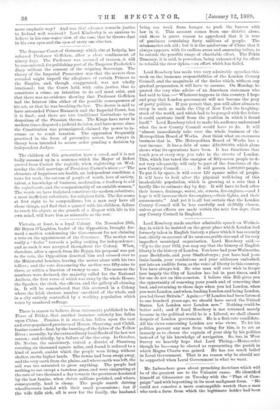The Supreme Come" of Germany, which sits at Leipzig, has
released Professor Geffeken, after a close confinement of ninety days. The Professor was accused of treason, it will be remembered, for publishing part of the Emperor Frederick's diary without the consent of the reigning Sovereign. The theory of the Imperial Prosecutor was that the secrets thus revealed might imperil the allegiance of certain Princes to the Empire, and, though exaggerated, was not wholly irrational ; but the Court held, with calm justice, that to constitute a crime, an intention to do evil must exist, and that there was no evidence showing that Professor Geffcken had the faintest idea either of the possible consequences of his act, or that he was breaking the law. The decree is said to have astounded Prince Bismarck and the Imperial Court, but it is final ; and there are two traditional limitations to the despotism of the Prussian throne. The Kings have never in modern times disputed a judicial decision, and have never, since the Constitution was promulgated, claimed the power to in- crease or to remit taxation. The oppression frequently practised in the form of preventive arrest, has always in theory been intended to secure order pending a decision by independent Judges.






































 Previous page
Previous page